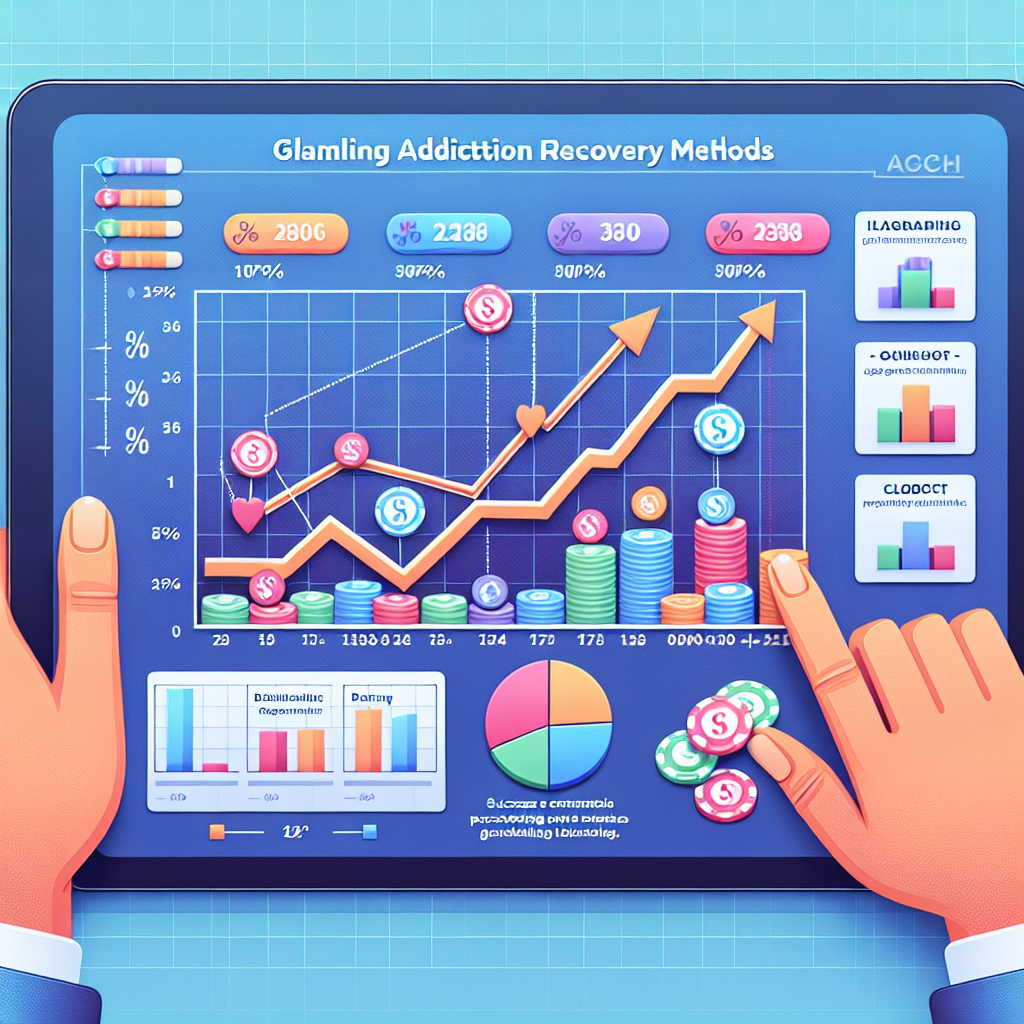-
Table of Contents

“Comparing Paths to Freedom: Success Rates of Gambling Addiction Recovery Methods”
Introduction
Gambling addiction, a pervasive and often debilitating condition, affects millions of individuals worldwide. Recovery from this addiction is challenging, necessitating a multifaceted approach tailored to the individual’s needs. Various methods have been developed to aid in the recovery process, each with differing success rates. Cognitive-behavioral therapy (CBT) is one of the most widely studied and effective treatments, boasting success rates of around 60-80% in reducing gambling behaviors. Self-help groups, such as Gamblers Anonymous, offer peer support and have shown success rates of approximately 20-30%, though these figures can vary widely based on participant engagement and commitment. Pharmacological treatments, including medications like naltrexone and antidepressants, have demonstrated moderate success, with rates ranging from 30-50% in reducing gambling urges and behaviors. Additionally, newer approaches like mindfulness-based therapies and internet-based interventions are emerging, showing promising preliminary results but requiring further research to establish their efficacy. Overall, the success of gambling addiction recovery methods is influenced by various factors, including the severity of the addiction, the individual’s motivation, and the presence of co-occurring mental health disorders.
Success Rates of Cognitive Behavioral Therapy in Gambling Addiction Recovery
Cognitive Behavioral Therapy (CBT) has emerged as a cornerstone in the treatment of gambling addiction, offering a beacon of hope for those ensnared by the grip of compulsive gambling. This therapeutic approach, grounded in the principles of cognitive restructuring and behavioral modification, aims to address the underlying thought patterns and behaviors that fuel addiction. The success rates of CBT in gambling addiction recovery are promising, providing a testament to its efficacy and the potential for individuals to reclaim their lives.
One of the most compelling aspects of CBT is its structured and goal-oriented nature. By focusing on the present and working towards specific objectives, individuals are empowered to take control of their actions and thoughts. Studies have shown that CBT can significantly reduce gambling behaviors and improve overall mental health. For instance, research indicates that approximately 60-80% of individuals who undergo CBT experience a substantial reduction in gambling activities. This high success rate is attributed to the therapy’s ability to equip individuals with practical skills to manage triggers and cope with urges.
Moreover, CBT’s emphasis on self-awareness and self-regulation plays a crucial role in its effectiveness. Through techniques such as cognitive restructuring, individuals learn to identify and challenge distorted beliefs about gambling, such as the illusion of control or the gambler’s fallacy. By replacing these maladaptive thoughts with more realistic and balanced perspectives, individuals can break the cycle of addiction. Additionally, behavioral interventions, such as exposure therapy and response prevention, help individuals confront and manage their gambling-related impulses in a controlled and supportive environment.
Furthermore, the success of CBT in gambling addiction recovery is not limited to short-term gains. Longitudinal studies have demonstrated that the benefits of CBT can be sustained over time, with many individuals maintaining their progress and avoiding relapse. This enduring impact is partly due to the therapy’s focus on developing long-term coping strategies and fostering resilience. By building a robust toolkit of skills and techniques, individuals are better equipped to navigate the challenges and temptations that may arise in the future.
In addition to its direct impact on gambling behaviors, CBT also addresses the broader psychological and emotional issues that often accompany addiction. Many individuals struggling with gambling addiction also experience co-occurring mental health conditions, such as depression, anxiety, or substance abuse. CBT’s holistic approach allows for the simultaneous treatment of these issues, leading to comprehensive and lasting recovery. By improving overall mental health and well-being, individuals are more likely to achieve and maintain abstinence from gambling.
It is also worth noting that the success of CBT can be enhanced when combined with other therapeutic modalities and support systems. For example, integrating CBT with motivational interviewing or group therapy can provide additional layers of support and reinforcement. Moreover, the involvement of family and friends in the recovery process can create a supportive and nurturing environment, further bolstering the individual’s chances of success.
In conclusion, the success rates of Cognitive Behavioral Therapy in gambling addiction recovery are a testament to its effectiveness and transformative potential. By addressing the cognitive and behavioral aspects of addiction, CBT empowers individuals to break free from the cycle of compulsive gambling and build a healthier, more fulfilling life. The journey to recovery may be challenging, but with the right tools and support, it is undoubtedly within reach.
Comparing Success Rates of Inpatient vs. Outpatient Treatment for Gambling Addiction
When it comes to overcoming gambling addiction, the journey to recovery can be challenging, but it is certainly achievable with the right support and treatment. One of the critical decisions individuals face is choosing between inpatient and outpatient treatment programs. Both approaches have their unique advantages and success rates, and understanding these can help individuals make informed decisions about their recovery path.
Inpatient treatment programs, also known as residential treatment, involve individuals staying at a treatment facility for a specified period, typically ranging from 30 to 90 days. This immersive environment provides a structured and supportive setting, free from the triggers and temptations of the outside world. The success rates for inpatient treatment are generally high, with studies indicating that approximately 70% of individuals who complete an inpatient program experience significant improvements in their gambling behaviors. The intensive nature of inpatient treatment allows for comprehensive therapy, including individual counseling, group therapy, and holistic approaches such as mindfulness and stress management techniques. This multifaceted approach addresses the underlying psychological and emotional issues contributing to gambling addiction, fostering long-term recovery.
On the other hand, outpatient treatment programs offer flexibility, allowing individuals to receive treatment while continuing with their daily responsibilities, such as work or family commitments. Outpatient programs typically involve regular therapy sessions, which can be scheduled around the individual’s availability. The success rates for outpatient treatment can vary, but research suggests that approximately 50% to 60% of individuals who engage in outpatient programs achieve significant improvements in their gambling behaviors. While outpatient treatment may not provide the same level of immersion as inpatient programs, it offers the advantage of real-world application. Individuals can immediately implement coping strategies and skills learned in therapy into their daily lives, which can be particularly beneficial for those with strong support systems at home.
Transitioning from one form of treatment to another can also be a viable option for many individuals. For instance, some may start with an inpatient program to establish a solid foundation for recovery and then transition to outpatient treatment for continued support. This combination approach can enhance the overall success rates, as it allows individuals to benefit from the intensive support of inpatient care while gradually reintegrating into their everyday lives with the ongoing guidance of outpatient therapy.
It is essential to recognize that success rates can be influenced by various factors, including the individual’s level of commitment, the presence of co-occurring mental health disorders, and the availability of a robust support network. Personalized treatment plans that address these unique needs can significantly enhance the likelihood of successful recovery. Additionally, ongoing aftercare and support groups, such as Gamblers Anonymous, play a crucial role in maintaining long-term sobriety and preventing relapse.
Ultimately, the choice between inpatient and outpatient treatment should be based on individual circumstances, preferences, and the severity of the addiction. Both approaches offer valuable tools and resources for overcoming gambling addiction, and with determination and the right support, individuals can achieve lasting recovery. The journey may be challenging, but it is important to remember that recovery is possible, and many have successfully reclaimed their lives from the grips of gambling addiction. By exploring the available treatment options and committing to the process, individuals can find hope and healing on their path to a healthier, more fulfilling life.
Q&A
1. **Question:** What is the success rate of Cognitive Behavioral Therapy (CBT) for gambling addiction recovery?
**Answer:** Cognitive Behavioral Therapy (CBT) has a success rate of approximately 60-80% for individuals who complete the treatment program.
2. **Question:** What is the success rate of 12-step programs like Gamblers Anonymous for gambling addiction recovery?
**Answer:** The success rate of 12-step programs like Gamblers Anonymous varies widely, but it is generally estimated to be around 20-30% for long-term recovery.
Conclusion
The success rates of different gambling addiction recovery methods vary widely depending on the approach and individual circumstances. Cognitive-behavioral therapy (CBT) has shown success rates ranging from 50% to 75% in reducing gambling behaviors. Self-help groups like Gamblers Anonymous report that around 8% to 12% of participants achieve long-term abstinence. Pharmacological treatments, such as opioid antagonists, have demonstrated moderate success, with some studies indicating a reduction in gambling behavior in about 30% to 50% of cases. Overall, a combination of therapy, support groups, and medication tends to yield the best outcomes, though individual success can vary significantly.



